We need your consent to use the individual data so that you can see information about your interests, among other things. Click "OK" to give your consent.
ASTM G187-12a
Standard Test Method for Measurement of Soil Resistivity Using the Two-Electrode Soil Box Method (Includes all amendments And changes 7/12/2018).
Automatically translated name:
Standard Test Method for Measurement of Soil Resistivity Using the Two-Electrode Soil Box Method
STANDARD published on 1.11.2012
The information about the standard:
Designation standards: ASTM G187-12a
Note: WITHDRAWN
Publication date standards: 1.11.2012
SKU: NS-57564
The number of pages: 6
Approximate weight : 18 g (0.04 lbs)
Country: American technical standard
Category: Technical standards ASTM
The category - similar standards:
Annotation of standard text ASTM G187-12a :
Keywords:
soil box, soil box factor, soil resistivity, two-electrode soil box, ICS Number Code 13.080.99 (Other standards related to soil quality)
Additional information
| Significance and Use | ||||||||||||
|
5.1 The resistivity of the surrounding soil environment is a factor in the corrosion of underground structures. High resistivity soils are generally not as corrosive as low resistivity soils. The resistivity of the soil is one of many factors that influence the service life of a buried structure. Soil resistivity may affect the material selection and the location of a structure.5 5.2 Soil resistivity is of particular importance and interest in the corrosion process because it is basic in the analysis of corrosion problems and the design of corrective measures. 5.3 The test method is focused to provide an accurate, expeditious measurement of soil resistivity to assist in the determination of a soil’s corrosive nature. Test Method G57 emphasizes an in situ measurement commonly utilized in the design of a buried structures’ corrosion control (cathodic protection systems’ ground bed design, and so forth). The two-electrode soil box method often compliments the four-pin, 5.4 The saturated soil resistivity determined by this test method does not necessarily indicate the minimum soil resistivity. |
||||||||||||
| 1. Scope | ||||||||||||
|
1.1 This test method covers the equipment and procedures for the measurement of soil resistivity, for samples removed from the ground, for use in the assessment and control of corrosion of buried structures. 1.2 Procedures allow for this test method to be used in the field or in the laboratory. 1.3 The test method procedures are for the resistivity measurement of soil samples in the saturated condition and in the as-received condition. 1.4 The values stated in SI units are to be regarded as the standard. The values given in parentheses are for information only. Soil resistivity values are reported in ohm-centimeter. 1.5 This standard does not purport to address all of the safety concerns, if any, associated with its use. It is the responsibility of the user of this standard to establish appropriate safety and health practices and to determine the applicability of regulatory limitations prior to use. |
||||||||||||
| 2. Referenced Documents | ||||||||||||
|
Similar standards:
Historical
1.11.2011
Historical
1.7.2008
Historical
1.12.2011
Historical
1.11.2009
Historical
1.8.2013
Historical
15.1.2013
We recommend:
Technical standards updating
Do you want to make sure you use only the valid technical standards?
We can offer you a solution which will provide you a monthly overview concerning the updating of standards which you use.
Would you like to know more? Look at this page.


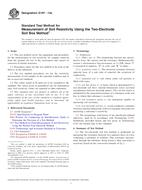
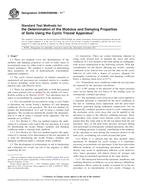 ASTM D3999/D3999M-11..
ASTM D3999/D3999M-11..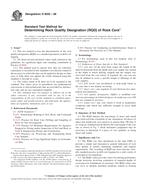 ASTM D6032-08
ASTM D6032-08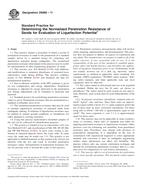 ASTM D6066-11
ASTM D6066-11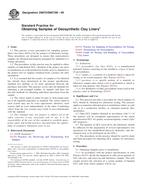 ASTM D6072/D6072M-09..
ASTM D6072/D6072M-09..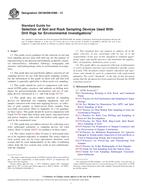 ASTM D6169/D6169M-13..
ASTM D6169/D6169M-13..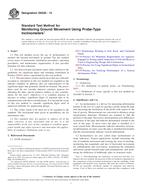 ASTM D6230-13
ASTM D6230-13
 Cookies
Cookies
